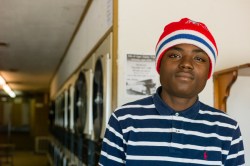About a year ago, during a cross-faded conversation that felt profound but probably sounded more like this, a friend told me about Strauss-Howe generational theory, a scholarly take on the somewhat narcissistic assumption that each generation has a signature personality that leaves a unique mark on world culture and history. Strauss and Howe identify four archetypes — prophets, nomads, heroes, or artists — that can define an entire generation based on the societal conditions they grew up in.
Humblebrag alert: Millennials comprise a Hero Generation. This means we were born “during a time of individual pragmatism, self-reliance, and laissez faire” (in other words, the Reagan/Bush Sr./Clinton years) and are coming of age “as team-oriented young optimists during a Crisis.” If that all sounds too conveniently perfect, remember that Strauss and Howe came up with this back in 1991, when Barack Obama was still fresh out of law school and millennials were just psyched to be able to watch The Little Mermaid over and over on VHS.

The Geography of YouthPortraits of millennials from the Geography of Youth project. Click to embiggen.
I was born in 1989, which puts me about in the middle of the millennials (the generation loosely includes today’s 18- to 32-year-olds, but the parameters aren’t set in stone). I’ve always enjoyed waxing philosophical about the effects of shared cultural experiences, geeking out on everything from the parallels between Vietnam and Iraq to the age-perfect timing of each Harry Potter book release (the final volume came out the summer I graduated from high school, and the two occasions were almost equally momentous). I liked to ask my baby boomer parents about their childhoods in the ’60s and ’70s, and hearing their memories made me eager to speculate on what my generation’s place in history would be.

Jordan SteadCrowds took to the streets on election night 2012 in Seattle to celebrate Obama’s reelection and Washington state’s legalization of gay marriage and marijuana. Click to embiggen.
So what are millennials known for, so far? Well, to start with the obvious, we’re fucked financially. Anecdotes abound of millennials slaving away as unpaid interns and underpaid assistants, or slacking off as overqualified retail reps and baristas. “Generation Screwed,” Joel Kotkin called us in a thoroughly depressing July 2012 Newsweek feature that laid out the various headwinds holding us back: staggering levels of student debt (at least $25,000 on average, according to the latest reports); a 13.1 percent unemployment rate for 18- to 29-year-olds, compared to 7.9 percent nationally; and “a mountain of boomer- and senior-incurred debt … a toxic legacy handed over to offspring who will have to pay it off in at least three ways: through higher taxes, less infrastructure and social spending, and, fatefully, the prospect of painfully slow growth for the foreseeable future.”
Research shows that entering the workforce during a deep recession can have lasting effects [PDF] on future wages, even if the economy eventually bounces back. That lag is already visible for Generations X and Y: In 2010, Americans under 40 had accumulated 7 percent less wealth than 20- and 30-somethings in 1983 had, according to an Urban Institute study [PDF].

The Geography of YouthKelly, 20, of Lubbock, Texas, says her biggest concern is money. “My parents have next to nothing so I am constantly worried about what I can do to have enough to buy food alone.”
We’re off to a rocky start, and the path ahead only looks to get steeper and more slippery. Which led a recent article by Annie Lowrey in The New York Times — one of the latest entries in the popular Millennial Misfortunes genre — to ask, in its headline, “Do Millennials Stand a Chance in the Real World?” Ouch.
Even before the recession hit, my cohort’s ambivalent slouch toward adulthood inspired our title as the Boomerang or Peter Pan Generation; our widespread inability to fully flee the nest even led psychologist Jeffrey Jensen Arnett to famously raise the prospect of recognizing a new stage of life, Emerging Adulthood, the same way psychologists a century ago successfully made a case for adolescence as a phase distinct from childhood. After crunching the numbers and looking at our long-term prospects for financial maturity, the establishment is understandably starting to freak out a little bit: It looks like the country’s got about 80 million Buster Bluths on its hands. How can we be counted on to tackle looming global challenges like climate change if we can’t even take care of ourselves?
But what’s clear now — and maybe wasn’t when the Gen Y “failure to launch” theme first emerged — is that millennials’ seemingly aimless, noncommittal approach to life doesn’t necessarily signify laziness or apathy or an inability to take anything seriously. We’re not a slacker generation, nor are we politically naïve: We were born into the fast-paced optimism of the money-happy ’80s and ’90s, only to come of age as a drawn-out, indefensible war and crippling financial crisis exposed our leaders as self-serving, untrustworthy fuckups. In this world they’ve left us with, we’re not sharing shabby apartments and living on coffee-shop tips out of some blithe desire to experiment. Experimentation is when you’re 15 and you skip history class to get high, knowing how little this forbidden risk-taking really matters for your future, provided it recurs just infrequently enough to allow you to achieve everything you’re told you’re capable of. What we’re experiencing now isn’t rebellion, it’s reality — just not the reality we thought we’d be rewarded with for playing by the rules.

The Geography of YouthReggina and Gary, both 20, of New Orleans. Ten years from now, Reggina sees herself with her own practice in creative arts therapy. Gary says, “I will always be searching.”
Which makes The New York Times’ question — can we miserable millennials make it in the Real World? — sort of moot. Rather, it begs a new question: Just what is the “real world” anymore? Maybe my generation’s collective struggle to emerge as adults hints that the very experience of living and working in this country is ripe and ready for some fundamental changes. Or as Signe-Mary McKernan, one of the authors of the Urban Institute study on wealth, says, “Maybe this generation won’t have a worse life, but just a different life.”
We’re already the harbingers of a profound demographic shift in this country; our children will be the ones who fully flesh out this new, diverse, interconnected America (in 2011, for the first time, children born to people of color made up more than half of U.S. births). Included in our necessarily more pluralistic, progressive, tolerant worldview is an acute awareness of sustainability and the need to find a place for it in a political system that increasingly does not reflect our changing values.

The Geography of YouthTina, 29, of Ontario, says her biggest concern in life right now is “Trying to figure out what I want to be when I grow up.”
“I don’t know if I buy a lot of the stuff that’s been written about millennials,” says Morrigan McCarthy, age 30 and co-creator of the Geography of Youth, a project that documents the experiences of millennials worldwide. She and collaborator Alan Winslow, almost 29, have spent nearly two years traveling the world, photographing millennials and asking them a few simple questions about their current circumstances and expectations for the future. From these hundreds of encounters emerges a sort of character sketch of a generation, unexpectedly poignant both in its quiet respect for individual lives and in the common threads of longing that show through.
“A lot of older people we talk to about the project will tell us that they’re completely stumped at how optimistic our generation is,” McCarthy continues. “Regardless of life circumstances, that optimism theme really does carry through. People we’ve met who are in situations that just seem absolutely hopeless are still saying they’re pretty sure they’re going to get what they want out of life.”

The Geography of YouthKristin, 24, of Galveston, Texas, felt like an adult “until the moment I learned I was pregnant. That made me realize how young and unprepared I feel.”
You could dismiss this as youthful naïveté, but I think it’s also a sign of how our reality has influenced our expectations. Our confidence only sounds delusional under the assumption that what we want out of life is a four-bedroom house in a nice suburb, two or three cars, and kids with private-school educations. Instead, McCarthy says, “In general we’re much more interested in experience over material good. That’s something that’s much easier to achieve in this economy, in this world we live in. Subconsciously we know we’re not going to be able to do what our parents’ generation did.” Or, as Neil Howe (of Strauss-Howe generational theory fame), put it in Lowrey’s article: “They look at the house their parents live in and say, ‘I could work for 100 years and I couldn’t afford this place.’”
We know the financial odds are stacked against us, and instead of trying to beat them, we’d rather give the finger to the whole rigged system. What millennials seem to be striving for, McCarthy observes, is “getting some sort of satisfaction from work, whatever that means to you. You’ve got to love what you do or love the people you work with. We don’t get many people who say what they’re looking for in life is money.”

The Geography of YouthLavonte, 18, of Waller, Texas, has felt like an adult for three years, since his Grandma passed. “I been on my own ever since.”
Indeed, it seems that millennials are ahead of the curve in our embrace of what Grist’s David Roberts calls the medium chill, or the decision to forgo the rat race — where “there will always be a More and Better just beyond our reach, no matter how high we climb” — in pursuit of more authentic and lasting happiness. From our perspective, a traditional career path looks like an endless ladder constantly sprouting new steps, while we’re all still on the ground, jumping for the first rung. So we’re looking for ways to avoid that ladder altogether — maybe by climbing a tree instead.
As achieving success in the traditional sense requires ever more exhausting amounts of ambition, it makes sense that millennials would see the pursuit of meaningful relationships as a better investment of energy. Just look at hipster enclaves like Brooklyn or Portland, with its reputation as “where 20-somethings go to retire.” There aren’t a lot of corporate career opportunities in Portland, but its concentration of similar-aged and -minded people offers the chance to build a strong social support system whose loyalty will endure longer than the next dead-end job. Just a few years out of college, my friends and I already talk of feeling torn between pressure to pursue the “next step” (or any step) in our careers, and reluctance to leave the places where we’ve started to settle into our adult lives, gradually coming to see ourselves as part of a community.

The Geography of YouthThomas, 30, of Montgomery, Ala., says he already has what he wants out of life: “A woman who loves me, and a conviction that there is something to be learned everywhere, in every moment.”
That’s why millennials have an interest, Winslow says, in “providing different approaches to that traditional work model.” The mark we leave on the world is more important to us than the money we make doing it, and after lifelong encouragement from our helicopter parents and touchy-feely teachers to follow our passions, we’re full of creative energy that we dream of pouring into a vocation, not relegating to hobby status. Our blurring of work-life boundaries is already spurring companies to rethink the traditional work day, and we’re more likely to want to work for a company that gives back to the community, according to a 2011 Deloitte Volunteer Impact Survey.
McCarthy sees us as “a generation of problem solvers” who are generally “interested in contributing in a positive way to the world that we live in, whether that’s on a small local level or on a conceptual, global level.” Combine that with our unprecedented ability to access and share information, and “it’s really exciting for the future. We won’t be the richest generation ever, but I think we will have a lot of great ideas that [will] change the way things are done.”
But while millennials may be sold on the medium chill, we’re pushing against a system that assumes the big chill is still everyone’s end goal. That’s why it looks like we’re flailing (and make no mistake: We are flailing, when it comes to achieving any semblance of financial security). We have huge potential and desire to innovate, but we also recognize that we can’t fulfill that potential without same basic safety nets. Things like health insurance. Some level of student debt forgiveness. Infrastructure that supports the kind of smaller-footprint, sustainable lifestyles we’re already creating for ourselves: compact housing in vibrant, walkable communities; functioning public transportation; streetscapes that prioritize cyclists and pedestrians over cars; urban gardens and farmers markets; regulatory room for sharing economies to thrive.
As is often the case, the market is way ahead of policy in responding to millennials’ changing consumption patterns — witness the explosion of car sharing to fill the void created by our lack of interest in car ownership, or the various brouhahas over microhousing. But startups and savvy developers can’t fill every need created by the erosion of middle-class stability in America.
I don’t think my generation’s interest in this kind of sustainable, small-scale living is a phase. We’re not all going to rush out and buy cars and houses as soon as we turn 30, not only because we still won’t be able to afford them, but because we recognize that these fundamental shifts are good for society as a whole, that they represent a rejection of the mindset that got us into this mess. That’s the good news. The bad news is that we still have very little power in this country, and until those in charge stop seeing us as shiftless rogues, we’re going to be on our own in creating the life we want.
—
Help turn the Geography of Youth into a crowdsourced, global public art project and share your story.



